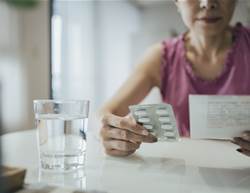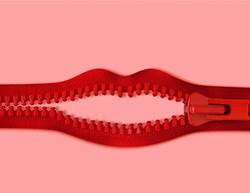Love it or hate it, licorice could be the secret to easing your menopausal symptoms. Studies show licorice roots contain compounds that activate oestrogen receptors to boost levels of the hormone in the body. During menopause your estrogen levels dip, triggering hot flushes, so this influx can help counteract such uncomfortable symptoms.
Not a fan of licorice sticks? Not a problem. It's the root itself—not the sugary treats flavoured with it—that are thought to be effective against menopausal symptoms, so taking supplements is just fine. A 2012 study of 90 women found that those who took capsules containing licorice extract reported decreased frequency and severity of hot flushes. And another conducted in 2014 found that women who took licorice supplements reported shorter duration of hot flushes.
Before you hop on the licorice bandwagon, though, take note of the latest findings: New research on the root as a treatment for menopausal symptoms has found that it may also contain compounds that interfere with prescription drugs if taken together.
Recent research found that three types of licorice—two North American species, Glycyrrhiza uralensis and G. inflata, and a European species called G. glabra—inhibited liver enzymes that help you metabolise drugs.
“The liver has enzymes that process medications, and if these enzymes are induced or inhibited, the drugs will either be processed too quickly or too slowly, respectively,” said van Breemen in the study's press release.
His team found that the two North American species induced these enzymes, meaning they could cause your body to process prescription drugs way too fast. They determined that the European species, G. glabra, was the least likely to interfere with medications because even though it inhibited the enzymes, it didn't induce them. Luckily for fans of licorice bullets, this is the species used most in lollies and confectionary.
Licorice is a potent root that has the potential to negatively affect the body in other ways, too. It contains glycyrrhizic acid, which can elevate sodium levels and reduce potassium levels, an effect that could lead to "abnormal heart rhythms, as well as high blood pressure, edema (swelling), lethargy, and congestive heart failure," according to the U.S. Food & Drug Administration. For this reason, it warns black licorice lovers over 40 with hypertension or heart problems to limit how much of it they eat.
To be safe, you should always tell your healthcare provider if you plan to take any supplements. Many believe licorice is a viable natural treatment for hot flushes, and there are plans to start clinical trials on G. glabra-based supplements in 2018.
Despite existing research that hails licorice's potential as a natural menopause symptom treatment, bioscientist Jodi Flaws does not believe there is enough. She has conducted her own research against its use for menopausal treatment.
Flaws' 2016 study on mice, published in the journal Reproductive Toxicology, found that one licorice compound, isoliquiritigenin, actually interfered with oestrogen production.
"We showed that isoliquiritigenin reduces the ability of the ovary to make the hormone oestrogen," says Flaws. "This finding is important because oestrogen is the major hormone produced by the ovary and it is also the hormone that is linked with a reduction in risk of hot flushes."
The Bottom Line
As with any dietary supplement, you should consult with your doctor before taking capsules containing licorice.










